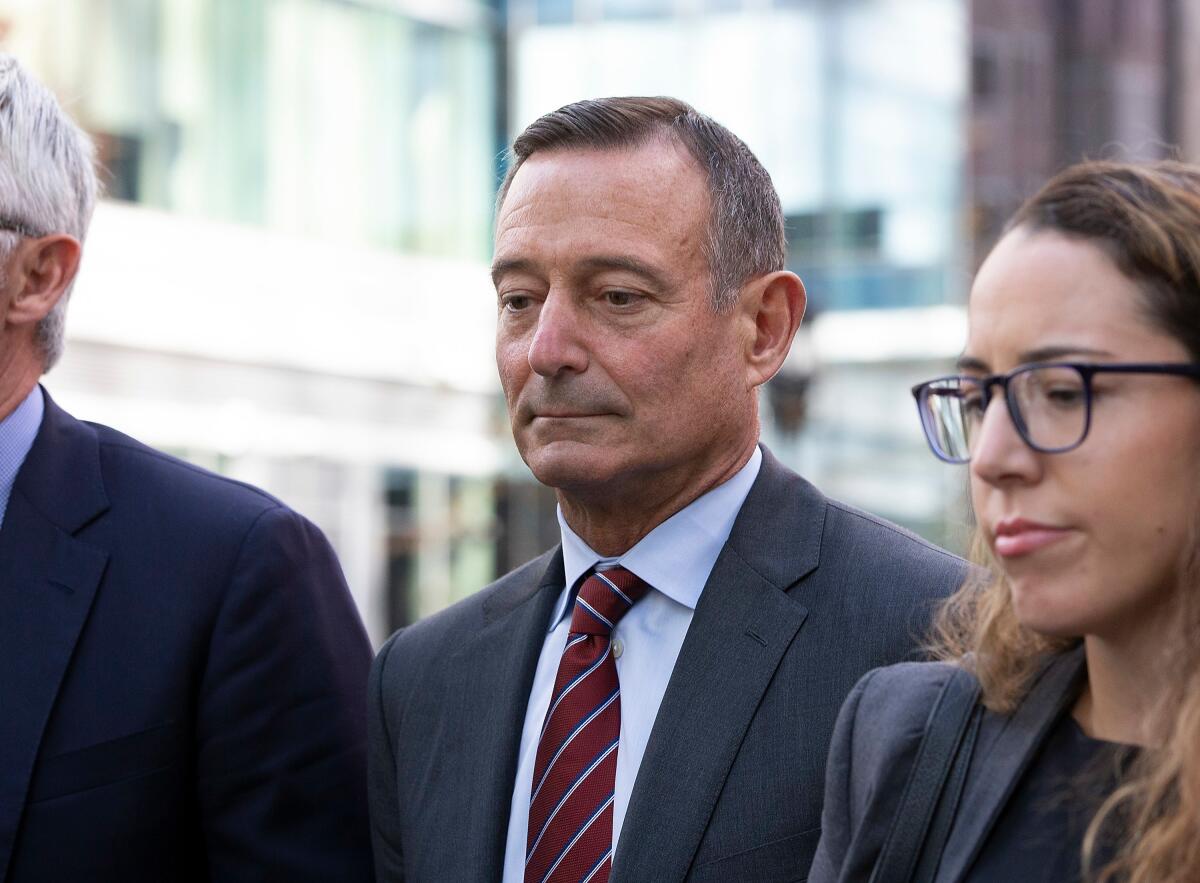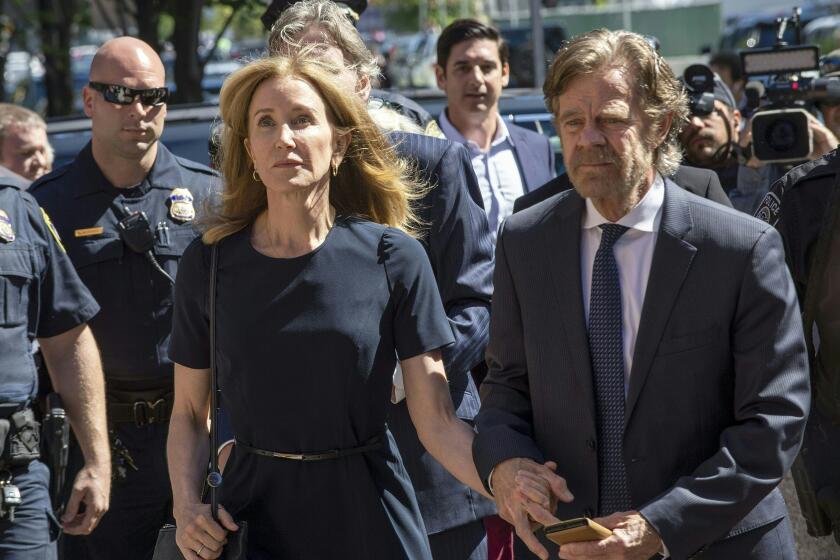Ex-CEO of investment giant Pimco given longest sentence to date in college admissions scandal

- Share via
Douglas Hodge, once the leader of an international bond manager and now an admitted felon, was ordered Friday to spend nine months in federal prison for paying bribes totaling $850,000 to get four of his children into USC and Georgetown as fake athletic recruits.
Hodge, 62, received the longest prison term of any of the 14 parents who have so far been sentenced for fraud and money laundering crimes they admittedly committed with William “Rick” Singer, a Newport Beach college admissions consultant who has acknowledged defrauding some of the country’s most selective universities for years with rigged exams, fake athletic credentials and bribes.
In addition to his prison term, U.S. District Judge Nathaniel M. Gorton ordered Hodge to pay a $750,000 fine, serve 500 hours of community service and remain on supervised release for two years.
“I know that I unfairly, and ultimately illegally, tipped the scales in favor of my children over others, over the hopes and dreams of other parents, who had the same aspirations for their children as I did for mine,” Hodge said in a statement. “To those children, and their parents, I can only express my deepest and sincerest regret.”
From the day he surrendered to authorities last March, Hodge, a resident of Laguna Beach, was among the highest-profile names in a scandal headlined with them. He rose to the head of Pimco, the bond management company based in Newport Beach, before retiring from the post of chief executive in 2016.
Federal prosecutors accused top CEOs, two Hollywood actresses and others of taking part in an audacious scheme to get their children into elite universities through fraud, bribes and lies.
Prosecutors from the U.S. attorney’s office in Boston had asked Gorton to send Hodge to prison for two years. In a memo filed before his sentencing, they criticized Hodge as a hypocrite, appearing to the world the image of success and integrity while leading “a secret double life, using bribery and fraud to fuel a mirage of success and accomplishment.”
Hodge’s lawyers said the request for a two-year prison term reflected the Boston prosecutors’ “single-minded obsession” with obtaining undeservedly lengthy sentences in the high-profile case. Gorton handed down in November what was previously the longest sentence in the case, a six-month term, to Toby Macfarlane. The Del Mar title insurance executive is incarcerated in Tucson scheduled to be released in June, according to Bureau of Prison records.
Hodge pleaded guilty in October to conspiring to commit fraud and money laundering. Along with three other parents, he reversed his not-guilty plea after prosecutors warned of a new indictment carrying a bribery charge.
Eleven parents — a group that includes the actress Lori Loughlin and her husband, J. Mossimo Giannulli — balked at the threat, maintained their not-guilty pleas and were indicted on a bribery charge. Fifteen parents have pleaded not guilty; 21 have admitted their guilt or said they plan to do so.
In court papers and a letter to the judge, Hodge described how he met Singer and, over the next decade, became one of his most frequent and lucrative clients. As Hodge looked for a college counselor, his old friend — the same friend who had suggested he apply for a job at Pimco in 1978 – recommended Singer “as the best possible mentor and guide,” his lawyers wrote in a memo.
College admissions scandal prosecutors recommend that a judge sentence four parents who have pleaded guilty to prison terms ranging from 18 to 26 months.
Singer helped Hodge’s oldest daughter apply to Georgetown. Her admission was guaranteed, prosecutors said, with an application that falsely described her as a competitive tennis player and two checks for $75,000 each that her father mailed to the home of Gordon Ernst, Georgetown’s tennis coach.
Hodge’s lawyers said only after Singer submitted the girl’s application did he disclose he’d revised her essay to include falsehoods about her tennis prowess. Hodge understood mailing personal checks to a coach “was not the standard process for making a college donation,” his lawyers said, but Singer explained it as a way to ensure only the tennis team got the money.
“Although Doug looked away from the aspects of Singer’s work that made him feel uncomfortable at the time, he now sees his actions in a stark light,” they wrote. “He committed fraud, plain and simple.”
Justin D. O’Connell, an assistant U.S. attorney in Boston, said Hodge did more than look away from Singer’s scheme. Hodge, he wrote in a memo, “engaged in the scheme more often, and over a longer period of time, than any of the defendants charged to date.”
After his daughter was admitted to Georgetown, Hodge repeated the scam at the school for his oldest son and at USC for two more children, spending $850,000 in all. In arguing for a two-year sentence, O’Connell pointed to what he said was Hodge’s willingness to bring his children into his crimes.
Douglas Hodge reversed course after prosecutors warned parents who had maintained their innocence that they could face a charge of federal program bribery.
He told his daughter to “stay under the radar,” and not tell a Georgetown interviewer that she had already been admitted through tennis, O’Connell wrote.
Hodge vehemently disputed this. “The government simply has the facts wrong on this,” he said. His lawyers said he took “great steps” to hide from his children the scheme to transform them into elite athletes on paper, and that prosecutors have no evidence they were aware of, let alone complicit in, the fraud.
More to Read
Sign up for Essential California
The most important California stories and recommendations in your inbox every morning.
You may occasionally receive promotional content from the Los Angeles Times.















